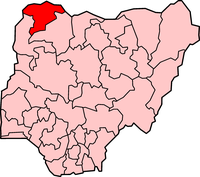Sokoto state is domiciled in the Northwest geopolitical zone of Nigeria and has the city of Sokoto as its capital. Sokoto state has a total nimber of 23 Local Government Areas which include Binji, Bodinga, Dange Shuni, Gada, Goronyo, Gudu, Gwadabawa, Illela, Isa, Kebbe, Kware, Rabah, Sabon Birni, Shagari, Silame, Sokoto north, Sokoto south, Tambuwal, Tangaza, Tureta, Wamako, Wurno, and Yabo with an estimated total population of about 3,696,999 inhabitants. Popular towns in sokoto state include Gudu, Yabo, Rabah, Gwada and Bawa. Islam is the major religion in Sokoto state consisting of the Sunni majority and the Shia minority muslims. Tertiary institutions in Sokoto state include the Sokoto state University, National Open University of Nigeria, Shehu Shagari College of Education, Sokoto state Polytechnic, Usman Danfodio University Sokoto, and the Usman Danfodiyo University Teaching Hospital School of Nursing.
Popular languages spoken in Sokoto state include the Hausa and English languages while popular festivals in the state include the Halbi and the Sharo festivals. Important landmarks in Sokoto state include the Kajuru castle, the Kamuku National park, Goronyo Dam, Sokoto Museum, Tomb of Usman Dan fodio, Shehu Kangiwa square, Waziri Junaid History and Culture Museum, Surame and Akalawa, and the palace of the Sultan of Sokoto. Health facilities found in Sokoto state include the Usman Danfodiyo University Teaching Hospital, Murtala Muhammed Specialist hospital, Saraki specialist hospital, Salihu Buhari and Binta Specialist hospital, Hussaini Medical Center, and the Federal Neuropsychiatric hospital kware.
The Governor of Sokoto State is Aminu Waziri Tambuwal.
Seat of the Caliphate
Sokoto state resides in the dry Sahel region and has a sandy topography with sparse distribution of hills. Temperatures are quite high at an average of 33 degrees centigrade with annual rainfall at 850 mm.
Humidity in Sokoto state is pegged at 26 percent while the state has a number of rivers which include the Sokoto river and the Gavangulbe river.
Agriculture is the main occupation of the people of Sokoto state with the cultivation of millet, rice, corn, cereals, and beans.
Fishing and Animal husbandry also provide a source of income for the people of sokoto state while popular markets such as the old market, Kasoa Dankure market, Kasoa Rubber market, Kasoa Ndaji market, Illela border market, Giginya Barracks Mammy market and the Sokoto central market are prominent hubs for trade and commerce.
Mineral Resources found in Sokoto state include Kaolin, Gold, Limestone, Phosphate, Gypsum, silica sand, clay, Laterite, Potash, Flakes, Granite, and salt.
Sokoto state was created in February 1976 from the defunct Northwest state. Referred to as Sakwatto in the local dialect, Sokoto city was the seat of the former sokoto caliphate with the Sultan being the spiritual leader of Nigeria’s Muslim population. Past governors of Sokoto state include
Usman Faruk- 1967-1975
Umaru Mohammed- 1976-1978
Gado Nasko- 1978-1979
Shehu Kangiwa- 1979-1981
Garba Nadama- 1982-1983
Garba Duba- 1984- 1985
Garba Mohammed- 1985-1987
Ahmed Daku- 1987-1990
Bashir Magashi- 1990-1992
Yahaya Abdulkarim- 1992-1993
Yakubu Muazu- 1993-1996
Rasheed Raji- 1996-1998
Rufai Garba- 1998-1999
Attahiru Bafarawa- 1999-2007
Aliyu Wamakko- 2007- 2015
Aminu Tambuwal- 2015-date.
4 based on 0 reviews

Find and explore some of the best businesses in Sokoto State.
© 2025 Manpower Nigeria. All rights reserved.